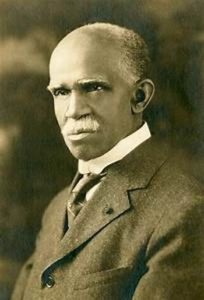
John Edward Bruce
*John Edward Bruce was born on this date in 1856. He was a Black journalist, historian, writer, orator, civil rights activist, and Pan-African nationalist.
Also known as Bruce Grit or J. E. Bruce-Grit, he was born a slave in Piscataway, Maryland, to enslaved parents Robert and Martha Allen (Clark) Bruce. When he was three years old, his father was sold to a slaveholder in Georgia, and Bruce never saw or heard from him again. He and his mother fled to Washington, D.C., and later to Connecticut, where Bruce enrolled in an integrated school and received his first formal education. Returning to Washington later, he received a private education and attended Howard University for a three-month course. After that, he never pursued formal education again and was primarily self-taught.
In 1874, at 18, Bruce became a messenger for the associate editor of the New York Times' Washington office. His duties included getting information for the next day's paper from Senator Charles Sumner. 1879 Bruce and Charles N. Otley founded the Argus Weekly newspaper in Washington, DC. They decided that the paper would "be a fearless advocate of the true principles of the Republican Party. Next, Bruce founded the Sunday Item in 1880 and the Republican in 1882, both in Norfolk, Virginia.
In 1884, he also served as the associate editor and business manager of the Baltimore, Maryland, Commonwealth. Later that year, he returned to Washington, D.C., to establish the Grit. He earned income as a paid contributor to The Boston Transcript, The Albany Argus, Buffalo Express, Sunday Gazette, and the Sunday Republic of Washington under his pen name of "Bruce Grit." Bruce married Florence A. Bishop of Cleveland, Ohio, on September 10, 1885, in Washington, DC.
Many black leaders espoused non-violent strategies for social change during the American Reconstruction era and after. Appalled at the rise of lynchings and imposition of legal segregation, Bruce supported armed self-defense against racist attacks. He supported "organized resistance to organized resistance." Bruce also became prominent on the lecture circuit, giving speeches that addressed lynching, the condition of southern blacks, and the weak American political system that failed to protect the rights of its black citizens. In 1890, he joined activist T. Thomas Fortune's Afro-American League, the first Black civil rights group. He became the organization's new president in 1898 when it reformed as the Afro-American Council.
In 1900, Bruce was a member of the literary bureau of the Republican National Committee. By 1908, he moved to New York, where he established the Yonkers, New York, Weekly Standard. Beginning in 1910, he worked as a probation officer and was American Correspondent for the African Times and Orient Review of London, England, edited by Dusé Mohamed Ali. In Harlem and Yonkers, Bruce became involved with the emerging community of intellectuals, including newly arrived immigrants from the Caribbean. In 1911, with Arthur Schomburg, he founded the Negro Society for Historical Research, first based in Yonkers, to create an institute to support scholarly efforts. For the first time, it brought together African, West Indian, and Afro-American scholars. This later became the foundation for the Schomburg Center for Research in Black Culture, New York Public Library.
He also mentored Hubert Henry Harrison, who became influential in Black socialism and nationalism. Bruce's belief in an independent national destiny for blacks in the United States led him in 1919 to embrace Marcus Garvey's Pan-African nationalism. As a member of his Universal Negro Improvement Association (UNIA), Bruce wrote for the movement's Negro World and the Daily Negro Times.
Despite his productivity, Bruce found that he had to work for the Port of New York Authority for most of his adult life to sustain himself. Bruce was a Prince Hall Mason, a member of the Humane Order of African Redemption and the African Society of London, now the Royal African Society. After he retired in 1922, he received a small pension until he died in New York City's Bellevue Hospital on August 7, 1924. Bruce was buried in Oakland Cemetery in Yonkers. More than 5,000 people attended three services honoring him.